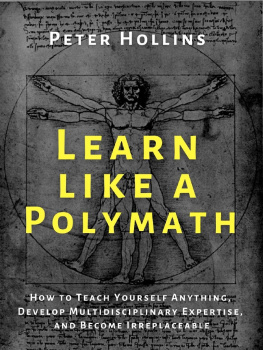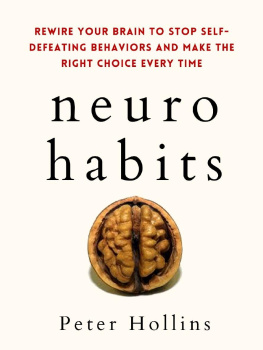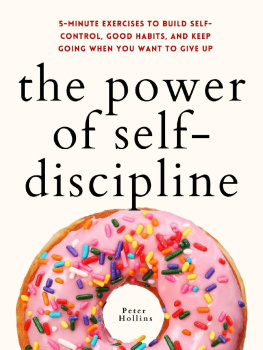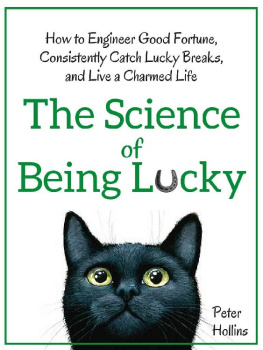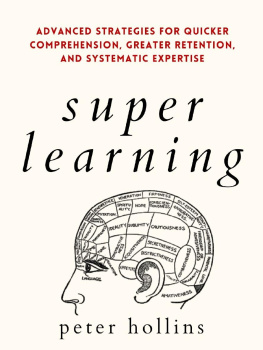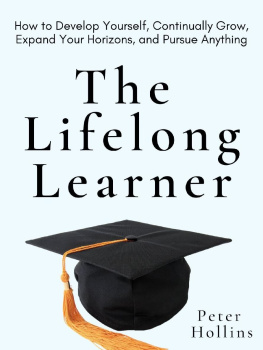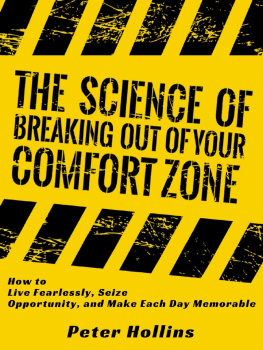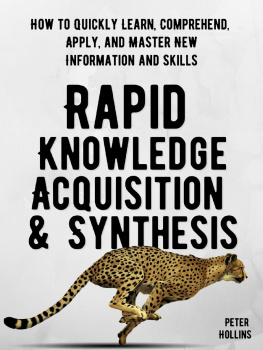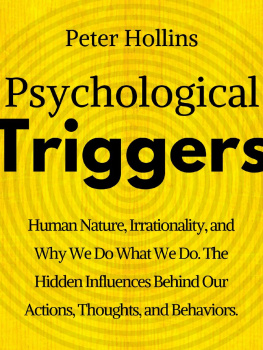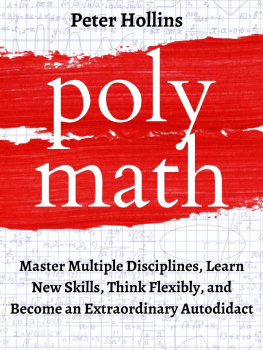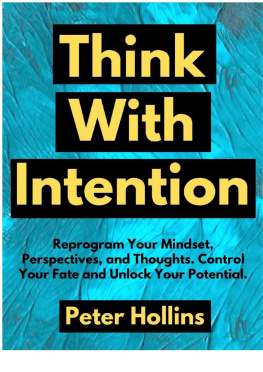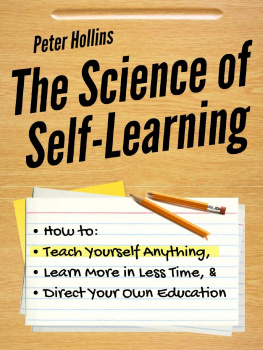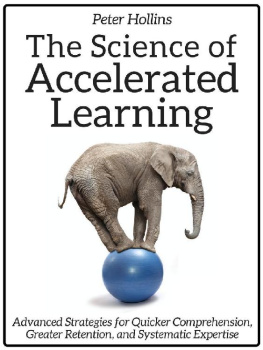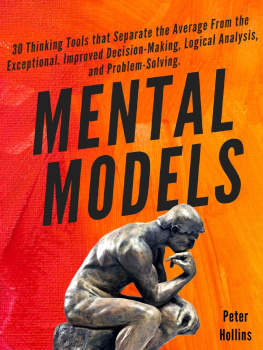Table of Contents
Learn Like a Polymath:
How to Teach Yourself Anything, Develop Multidisciplinary Expertise, and Become Irreplaceable
By Peter Hollins,
Author and Researcher at petehollins.com

< < CLICK HERE for your FREE 14-PAGE MINIBOOK: Human Nature Decoded: 9 Surprising Psychology Studies That Will Change the Way You Think. > >
--Subconscious Triggers
-- Emotional Intelligence
-- Influencing and Analyzing People

Table of Contents
Two Paths to Polymathy
Cross-Pollination as the Key
Guidelines and a Plan
The Science Behind Learning Transfer
Guidelines for Successful Transfer of Learning
Problem-Based Learning
Academic Analogies
Analogy Thinking
Using Concrete Examples
Mind-Mapping
Adaptable and Open
Experimental
Beginner
Belief
Relentless
Chapter 1. Deconstructing the Polymath
Think of the smartest, most successful people history has ever known. Which names come to your mind? Be it Einstein, Da Vinci, Bill Gates, Isaac Newton, Jeff Bezos, Elon Musk, or someone like them, their success can be attributed to one common factor: they were all polymaths. This means that they specialized and were knowledgeable in several different domains, and they integrated these disparate fields of study to create art, come up with scientific inventions, and so on.
Though this might sound intimidating and only achievable for those who are naturally highly intelligent, anyone can become a polymath with the right mindset and attitude. You may have heard that its better to specialize or master one skill rather than be a jack of all trades. Some cultures even have sayings like a man with twelve talents has nothing to eat for dinner. However, the modern workplace increasingly requires a more diversified skill set in order to thrive and achieve success.
To be the best in the world at one thing, you need to be better than everyone else who specializes in that field. But to be great, without being the best, at three or more subjects simultaneously is not only rare, but also significantly easier than being the greatest of the great in one field.
As such, being a polymath can be critical to leading a successful professional life, and in this book, were going to discuss how you can start thinking like one too.
Two Paths to Polymathy
Over the years, several theories have been presented to explain what makes someone a polymath. One such theory is Howard Gardners notion of multiple intelligences. To understand this theory, we first need to delve into what the traditional view of intelligence has been.
Historically, intelligence has been perceived in fairly one-dimensional ways. Your intellectual capacity was thought to be fixed at birth as a result of your genetic inheritance, without any possibility of change in the future. This intelligence mainly consisted of one's ability to comprehend language and logic, which could be measured using some standardized tests, such as IQ tests. (LumenLearning, Keith 2009)
Since then, much progress has been made in broadening our concept of intelligence. Gardner, a Harvard psychologist, considered the traditional view of intelligence insufficient for explaining how different people learn and exhibit their smarts. Where those who are highly articulate or able to solve complex logical problems are often considered to be conventionally intelligent, he emphasized those who are gifted in more creative fields, such as architecture, music, and dance.
Those who excel in creative fields rather than logical ones are often labeled as learning disabled, thought to be suffering from ADD, or are simply cast off as underachievers. This is because most classrooms cannot accommodate the ways of learning these individuals need to become more proficient in different subjects, and as a result, these learners dont excel in areas they are actually quite capable of grasping. Gardners theory revolutionizes this outdated approach to intelligence.
So what is his theory of multiple intelligences all about? According to Gardner, we all possess at least seven unique forms of intelligence through which we learn and retain information. All of these types of intelligence can be cultivated with the right learning tools, although some individuals are more developed in certain forms of intelligence compared to others. His system outlines the following different types of intelligence:
Linguistic intelligence
Individuals with high levels of linguistic intelligence are generally articulate and adept at expressing themselves through spoken or written words. They find it easy to learn new languages, enjoy reading various kinds of literature, playing word games or debating, and generally have a unique way with words. Such individuals commonly take up lawyering, writing, public speaking, journalism, and other language-related jobs.
Logical-mathematical intelligence
People who possess logical-mathematical intelligence are attuned to logical thinking and have excellent powers of reasoning or deduction. They are good at thinking abstractly about problems that involve various concepts or numbers, which makes them temperamentally suited to maths and the natural sciences. These skills are useful for those involved in programming, scientific research, accountancy, etc.
Spatial intelligence
Spatially intelligent individuals are great at visualizing information and processing or manipulating it in critically evaluative ways. This is similar to logical-mathematical intelligence, except spatial intelligence usually involves physical spaces or environments and the objects placed within them. Architects, painters, and engineers are some examples of people with high spatial intelligence.
Bodily-Kinesthetic intelligence
Having bodily-kinesthetic intelligence means possessing the ability to use your body and physical movements to retain information. People who have successfully developed this type of intelligence prefer to learn in a more hands-on fashion that involves dynamic activity rather than excessive thinking. They are also good at expressing themselves through their body language. Athletes, gym instructors, dancers, and actors are all intelligent in this way.
Musical intelligence
Musically intelligent individuals learn through sounds, rhythms, patterns, beats, and tones. Their talent lies in being able to produce, perform, and appreciate music. Conductors, songwriters, music teachers, instrumentalists and singers possess this type of intelligence in abundance.
Interpersonal intelligence
Interpersonal intelligence involves having a keen awareness and sensitivity to the emotions, mental states, and desires of other people. These individuals are conventionally known as people smart and can hit it off with just about anyone they meet. Interpersonally intelligent people tend to have many friends, learn through their interactions with others, and are generally empathetic in nature. This type of intelligence is common among psychologists, salesmen, politicians, etc.
Intrapersonal intelligence
This form of intelligence is the opposite of the previous one in that it involves being deeply aware of your own spiritual, mental, and emotional self. Individuals who possess intrapersonal intelligence are deeply aware of their strengths and weaknesses, fears, motivations, desires, and capacities. Counselors, social workers, and philosophers are generally high in intrapersonal intelligence. (LumenLearning, Keith 2009) (SimplyPsychology, Marenus 2020)

